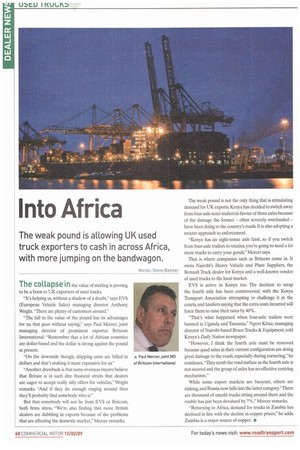Into Africa
Page 60

If you've noticed an error in this article please click here to report it so we can fix it.
The weak pound is allowing UK used truck exporters to cash in across Africa, with more jumping on the bandwagon.
Words: Steve Banner The collapse in the value of sterling is proving to be a boon to UK exporters of used trucks.
"It's helping us, without a shadow of a doubt," says EVS (European Vehicle Sales) managing director Anthony Wright. "There are plenty of customers around."
"The fall in the value of the pound has its advantages for us, that goes without saying," says Paul Mercer, joint managing director of prominent exporter Britcom International. "Remember that a lot of African countries are dollar-based and the dollar is strong against the pound at present.
"On the downside though, shipping costs are billed in dollars and that's making it more expensive for us."
"Another drawback is that some overseas buyers believe that Britain is in such dire financial straits that dealers are eager to accept really silly offers for vehicles," Wright remarks. "And if they do enough ringing around then they'll probably find somebody who is."
But that somebody will not be from EVS or Britcom, both firms stress, "We're also finding that more British dealers are dabbling in exports because of the problems that are affecting the domestic market," Mercer remarks. The weak pound is not the only thing that is stimulating demand for UK exports. Kenya has decided to switch away from four-axle semi-trailers in favour of three axles because of the damage the former — often severely overloaded — have been doing to the country's roads. It is also adopting a stricter approach to enforcement.
"Kenya has an eight-tonne axle limit, so if you switch from four-axle trailers to triaxles, you're going to need a lot more trucks to carry your goods," Mercer says.
That is where companies such as Britcom come in. It owns Nairobi's Heavy Vehicle and Plant Suppliers, the Renault Truck dealer for Kenya and a well-known vendor of used trucks to the local market.
EVS is active in Kenya too. The decision to scrap the fourth axle has been controversial, with the Kenya Transport Association attempting to challenge it in the courts, and hauliers saying that the extra costs incurred will force them to raise their rates by 40%.
"That's what happened when four-axle trailers were banned in Uganda and Tanzania," Ngovi Kitau, managing director of Nairobi-based Bruce Trucks & Equipment, told Kenya's Daily Nation newspaper.
"However, I think the fourth axle must be removed because quad axles in their current configuration are doing great damage to the roads, especially during cornering," he continues. "They scrub the road surface as the fourth axle is not steered and the group of axles has no effective centring mechanism."
While some export markets are buoyant, others are sinking, and Russia now falls into the latter category. "There are thousand of unsold trucks sitting around there and the rouble has just been devalued by 7%," Mercer remarks.
"Returning to Africa, demand for trucks in Zambia has declined in line with the decline in copper prices," he adds. Zambia is a major source of copper. •
































































































































































